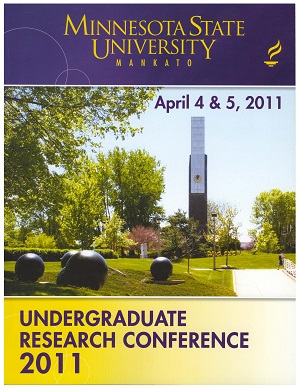The Will to Run: Mental Strategies Used by Recreational Marathon Runners
Location
CSU 204
Start Date
5-4-2011 9:00 AM
End Date
5-4-2011 10:30 AM
Student's Major
Human Performance
Student's College
Allied Health and Nursing
Mentor's Name
Cindra Kamphoff
Mentor's Department
Human Performance
Mentor's College
Allied Health and Nursing
Second Mentor's Name
Suzannah Armentrout
Second Mentor's Department
Human Performance
Second Mentor's College
Allied Health and Nursing
Description
The marathon is growing in popularity throughout the U.S. and the world. In fact, Buman, Omli, Giacobbi, and Brewer (2008) reported that over 300,000 more people participated in the 26.2 mile race in the United States in 2004 compared to 1980. Since the marathon takes several hours to complete and a variety of people are now running marathons, it is important to understand mental strategies that are used. Although there is research on the mental strategies of elite marathon runners (Raglin, 2007), there is a lack of research on the mental strategies used by recreational marathon runners and few qualitative research studies to date (Buman, Brewer, Cornelius, Van Raalte,& Petitpas, 2008). Therefore, the purpose of this study was to qualitatively explore how recreational marathon runners use mental strategies to overcome pain and adversity while training and completing the marathon. Twenty-one recreational marathoners (females = 10, males = 11) were interviewed using a semi-structured interview guide. Participants reported a variety of mental strategies used to overcome pain and adversity such as directing attention to themselves and their effort, remaining positive, focusing on the present, chunking the marathon into smaller parts, setting sufficient goals, and distracting themselves. Some strategies differed by the participant‘s goal (i.e., to finish vs. a specific time). Almost all of the runners experienced mental roadblocks including negative thinking, setting rigid goals, focusing on uncontrollable conditions, and dealing with internal and external pressure. Specific concrete mental strategies will be discussed further and ideas for future research will be shared.
The Will to Run: Mental Strategies Used by Recreational Marathon Runners
CSU 204
The marathon is growing in popularity throughout the U.S. and the world. In fact, Buman, Omli, Giacobbi, and Brewer (2008) reported that over 300,000 more people participated in the 26.2 mile race in the United States in 2004 compared to 1980. Since the marathon takes several hours to complete and a variety of people are now running marathons, it is important to understand mental strategies that are used. Although there is research on the mental strategies of elite marathon runners (Raglin, 2007), there is a lack of research on the mental strategies used by recreational marathon runners and few qualitative research studies to date (Buman, Brewer, Cornelius, Van Raalte,& Petitpas, 2008). Therefore, the purpose of this study was to qualitatively explore how recreational marathon runners use mental strategies to overcome pain and adversity while training and completing the marathon. Twenty-one recreational marathoners (females = 10, males = 11) were interviewed using a semi-structured interview guide. Participants reported a variety of mental strategies used to overcome pain and adversity such as directing attention to themselves and their effort, remaining positive, focusing on the present, chunking the marathon into smaller parts, setting sufficient goals, and distracting themselves. Some strategies differed by the participant‘s goal (i.e., to finish vs. a specific time). Almost all of the runners experienced mental roadblocks including negative thinking, setting rigid goals, focusing on uncontrollable conditions, and dealing with internal and external pressure. Specific concrete mental strategies will be discussed further and ideas for future research will be shared.
Recommended Citation
Harris, Amy. "The Will to Run: Mental Strategies Used by Recreational Marathon Runners." Undergraduate Research Symposium, Mankato, MN, April 5, 2011.
https://cornerstone.lib.mnsu.edu/urs/2011/oral-session-11/3




